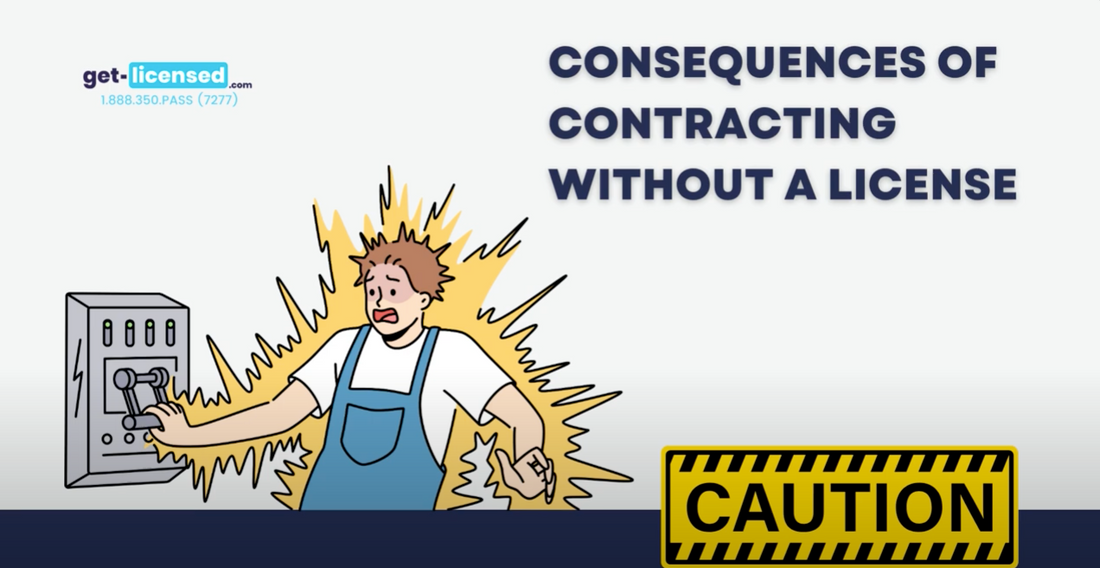
Consequences of Not Being Licensed in California
Share
Operating as an unlicensed contractor in California comes with significant risks that can affect your finances, legal standing, and reputation. The state’s strict regulations ensure consumer protection and hold contractors accountable. Failing to meet licensing requirements exposes you to penalties that could outweigh any short-term savings.
Navigation
- Legal Penalties for Unlicensed Work
- Financial Risks of Being Unlicensed
- Impact on Reputation
- Benefits of Getting Licensed
- Steps to Ensure Compliance
- Conclusion
Legal Penalties for Unlicensed Work
California law strictly prohibits unlicensed contractors from performing work exceeding $500 (including labor and materials). Violating this rule can lead to:
-
Fines and Penalties
- First offenses can result in fines of up to $500, along with additional administrative penalties.
- Repeat violations may lead to fines exceeding $10,000.
-
Misdemeanor Charges
- Unlicensed work is considered a misdemeanor in California, punishable by up to six months in jail.
-
Injunctions and Cease Orders
- The CSLB may issue cease-and-desist orders, preventing you from operating in any capacity.
-
Lawsuits and Liabilities
- You cannot enforce contracts in court if unlicensed, even if the client owes you payment.
Financial Risks of Being Unlicensed
Working without a license exposes contractors to several financial pitfalls:
1. Loss of Income
Unlicensed contractors forfeit the right to sue for unpaid work. Even if a client refuses to pay, you have no legal recourse.
2. Insurance Ineligibility
Without a license, obtaining contractor insurance is nearly impossible, leaving you personally liable for damages or injuries on the job.
3. Higher Penalty Costs
Fines and legal fees can quickly add up, overshadowing any earnings from unlicensed work.
Impact on Reputation
1. Loss of Trust
Clients may question your credibility and professionalism when they discover you’re unlicensed. Word of mouth and online reviews can significantly damage your reputation.
2. Limited Networking Opportunities
Other licensed contractors and suppliers may hesitate to work with or recommend you, further restricting your business growth.
3. Public Records
Penalties and violations are often recorded publicly, making it easy for potential clients to verify your non-compliance.
Benefits of Getting Licensed
Becoming a licensed contractor eliminates these risks and provides numerous advantages:
- Legal Protections: Enforce contracts and resolve disputes through lawful channels.
- Expanded Opportunities: Bid on larger projects and government contracts.
- Credibility: Build trust with clients and partners.
- Insurance Eligibility: Protect yourself and your business with proper coverage.
Steps to Ensure Compliance
If you’re operating as a contractor, here’s how to stay on the right side of the law:
1. Understand the $500 Rule
Avoid taking on projects that exceed the $500 limit unless you’re licensed.
2. Obtain Your Contractor License
Follow the CSLB’s licensing process to ensure you meet all requirements.
3. Stay Educated
Regularly review California’s contractor laws to ensure ongoing compliance.
4. Use Contracts Wisely
Always draft detailed contracts for projects, specifying costs and responsibilities. Licensed contractors can enforce these legally, unlike unlicensed individuals.
Conclusion
The consequences of working without a contractor license in California are steep, ranging from financial losses to legal troubles and reputational harm. While it may be tempting to avoid licensing requirements for smaller projects, the long-term risks far outweigh any short-term benefits. Obtaining a contractor license not only ensures compliance with the law but also sets you up for sustained success in the competitive construction industry.
Take Action Today
If you're ready to become licensed, visit the California Contractors State License Board (CSLB) for resources and application details. Don't let the risks of being unlicensed jeopardize your career!

